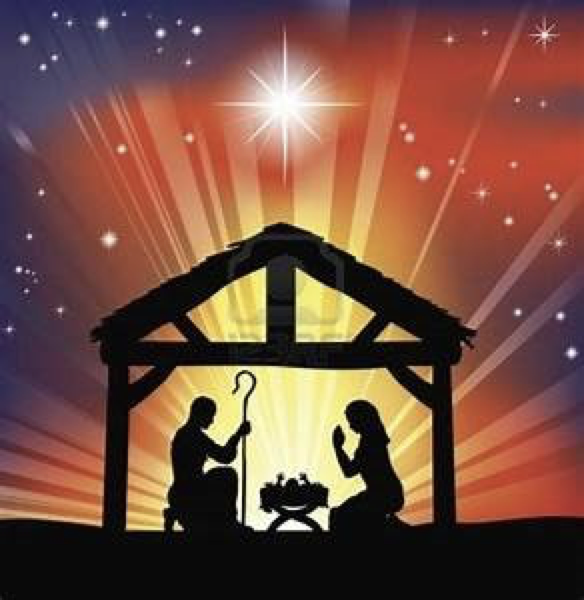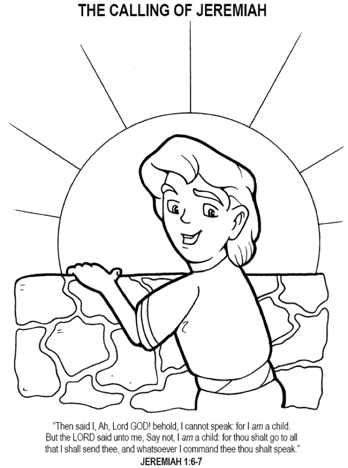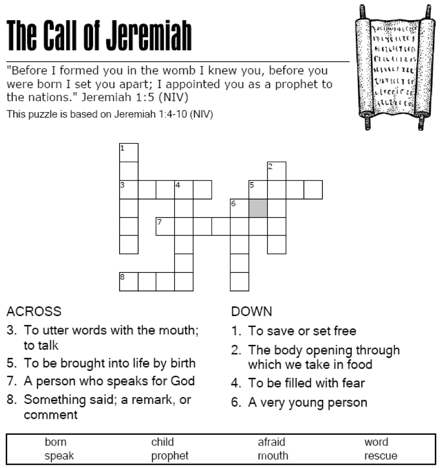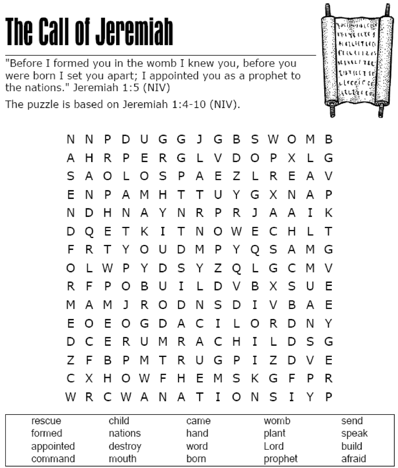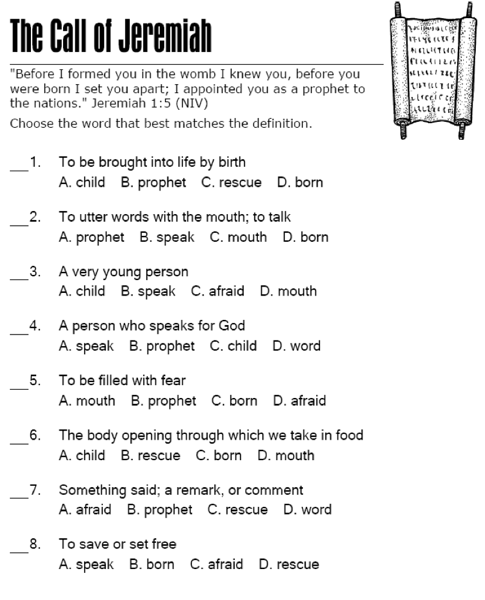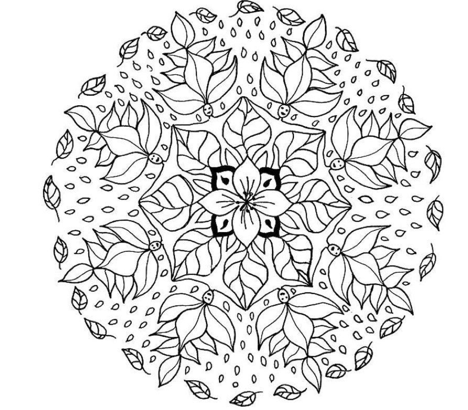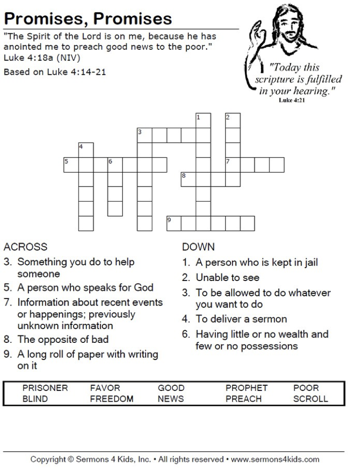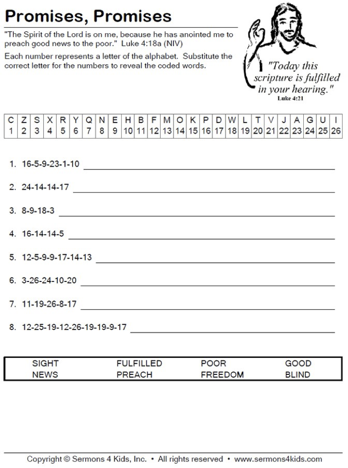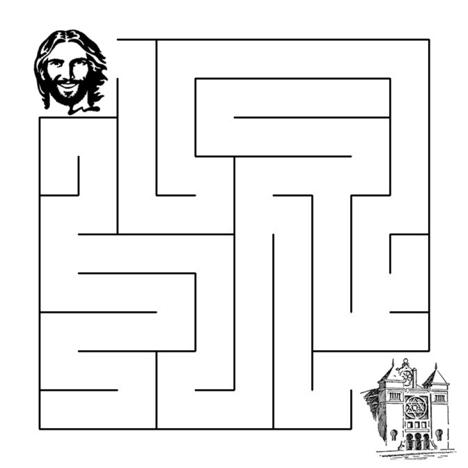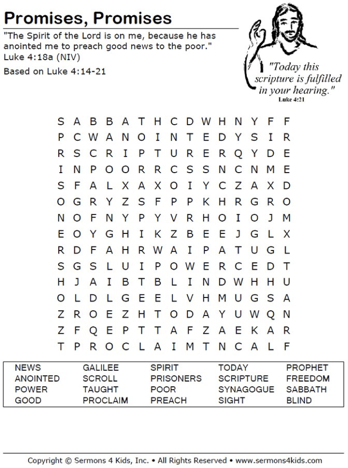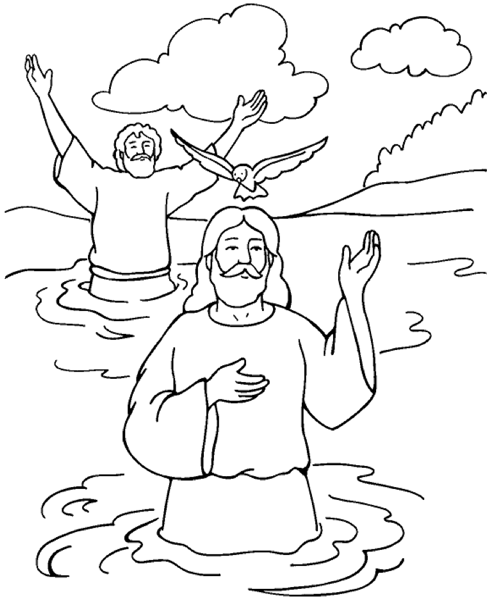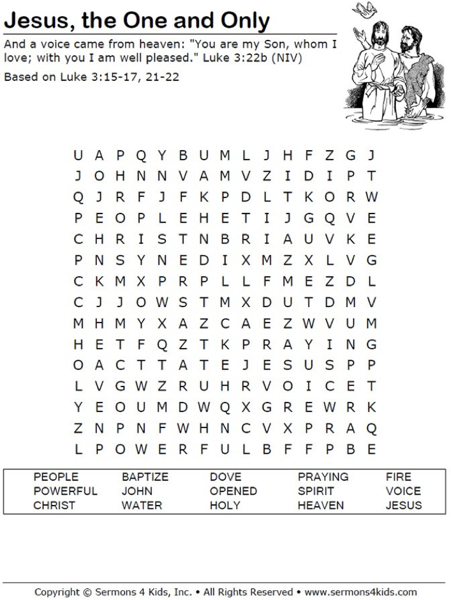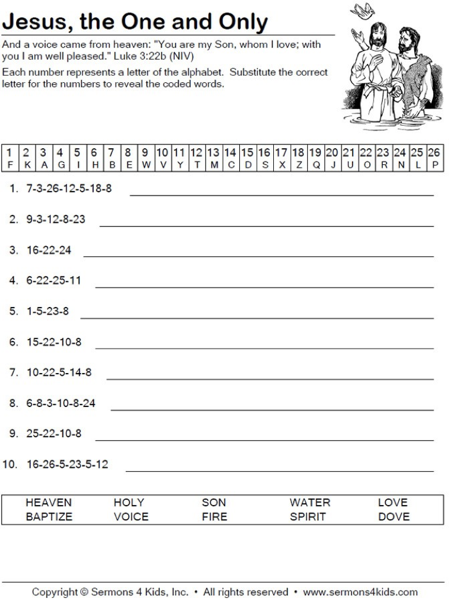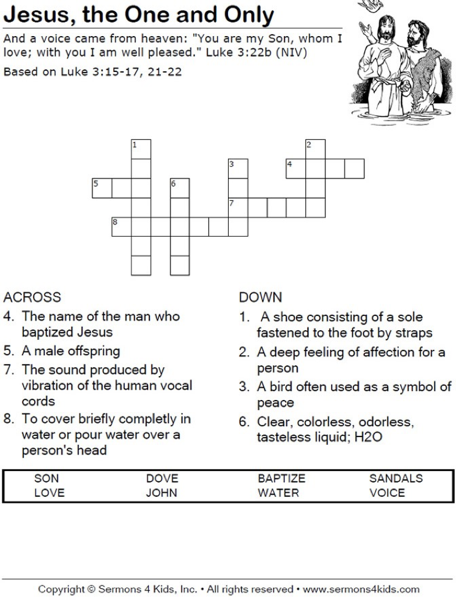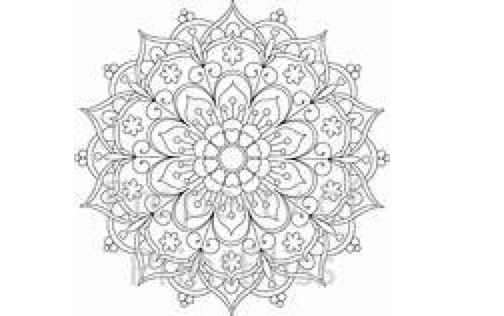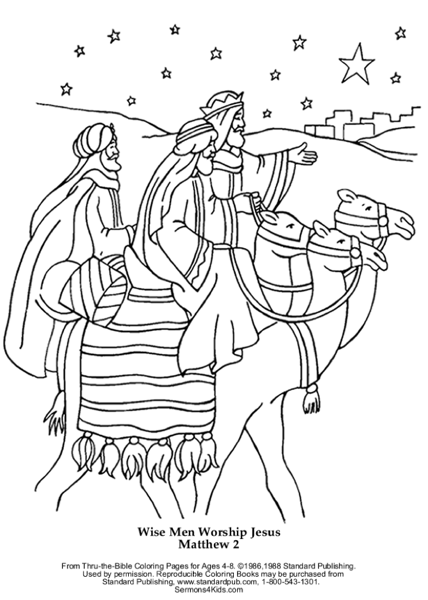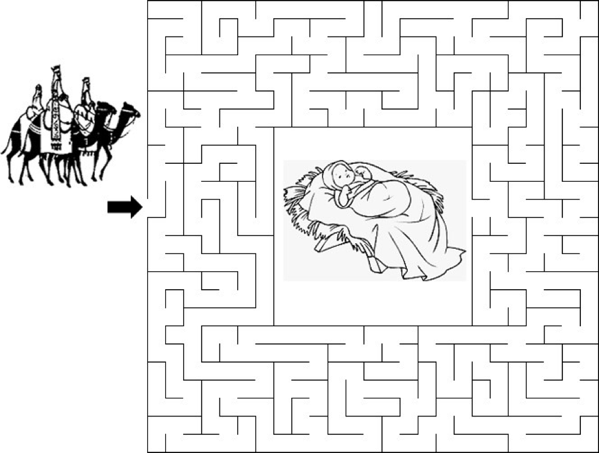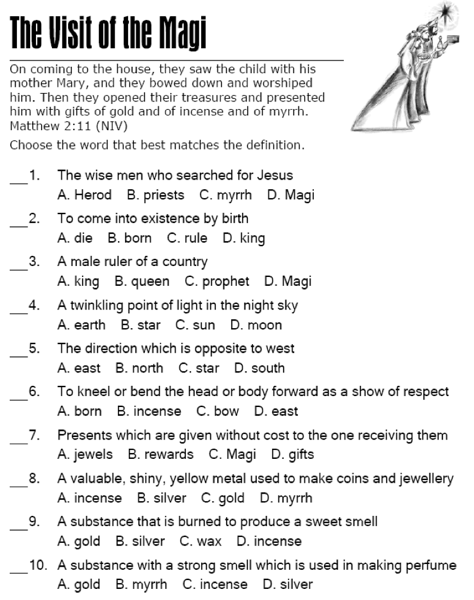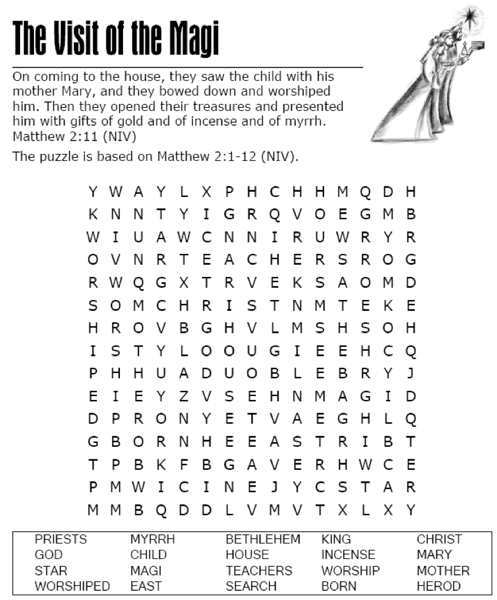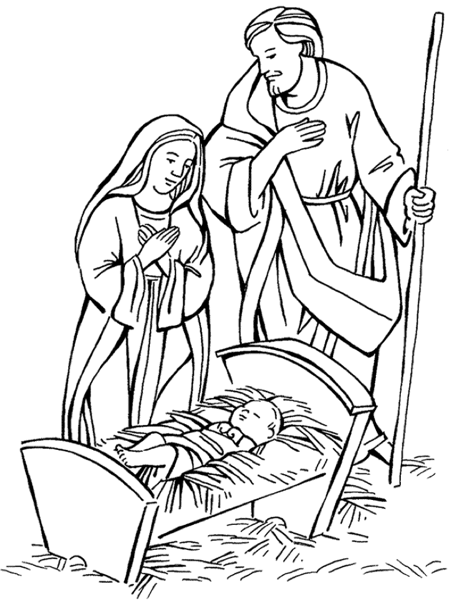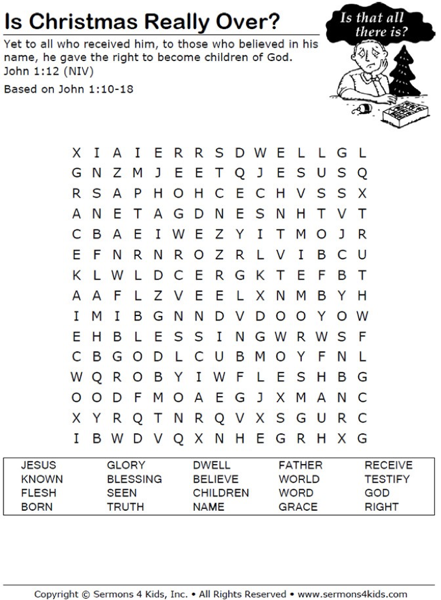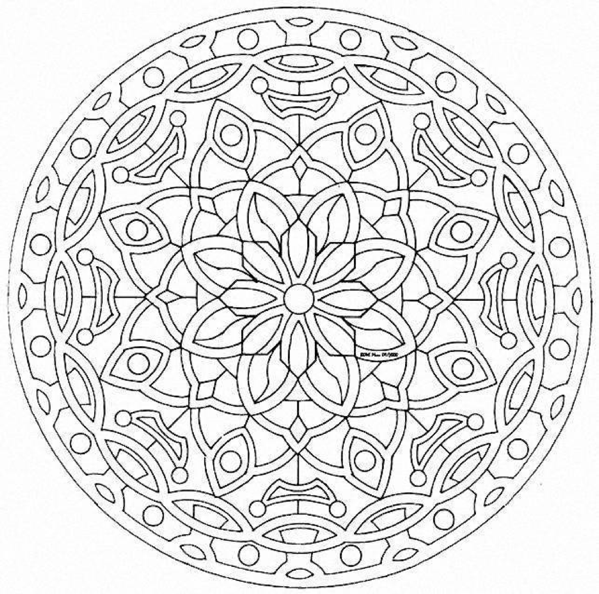This is a mandala-a way to help you meditate or pray. It does this through its circular shape and repeating patterns, which both calm and focus the mind.
Author: admin
Readings and Collect for the Second Sunday after Epiphany, January 23, 2022
Collect
In you, O Lord our God,
we find our joy,
for through your law and your prophets
you formed a people in mercy and freedom,
in justice and righteousness.
Pour your Spirit on us today,
that we who are Christ’s body
may bear the good news of your ancient promises to all who seek you. Amen
Readings
Nehemiah 8:1-3, 5-6, 8-10
Psalm 19
The heavens are telling the glory of God;
and the firmament proclaims his handiwork.
Day to day pours forth speech,
and night to night declares knowledge.
There is no speech, nor are there words; their voice is not heard;
yet their voice goes out through all the earth,
and their words to the end of the world.
In the heavens he has set a tent for the sun,
which comes out like a bridegroom from his wedding canopy,
and like a strong man runs its course with joy. Its rising is from the end of the heavens,
and its circuit to the end of them;
and nothing is hidden from its heat. The law of the Lord is perfect,
reviving the soul;
the decrees of the Lord are sure,
making wise the simple;
the precepts of the Lord are right,
rejoicing the heart;
the commandment of the Lord is clear,
enlightening the eyes; the fear of the Lord is pure,
enduring for ever;
the ordinances of the Lord are true
and righteous altogether.
More to be desired are they than gold,
even much fine gold; sweeter also than honey,
and drippings of the honeycomb. Moreover by them is your servant warned;
in keeping them there is great reward. But who can detect their errors?
Clear me from hidden faults.
Keep back your servant also from the insolent; do not let them have dominion over me.
Then I shall be blameless,
and innocent of great transgression.
Let the words of my mouth and the meditation of my heart be acceptable to you,
O Lord, my rock and my redeemer.
1 Corinthians 12:12-31a
Luke 4:14-21
Reflection for January 23, 2022 by the Rev’d Sheila Van Zandwyk
Right now we are in the midst of the season of Epiphany. An epiphany is among other things, “an illuminating discovery, realization, or disclosure” according to Merriam-Websters on-line dictionary. So during Epiphany we have readings around revelation, specifically the revelation of God seen through the person of Jesus Christ, but also the revelation of the nature and the work of God, revealed in a variety of ways.
Our Psalm this morning is a psalm of revelation. How God is revealed in nature and in the laws. “The heavens declare the glory of God, and the firmament shows his handiwork”, the psalmist writes and who of us cannot say that we have not stood in awe, wonder and absolute delight at the incredible beauty seen in our skies. But seeing God revealed in nature is more than just being in awe or delighted by the beauty and wonder of God. God’s nature is revealed in nature. The psalmist writes, “Day to day pours forth speech, and night to night declares knowledge.” The sense of nature pouring forth speech and knowledge is about nature revealing God, we see God’s triune nature of Father, Son and Holy Spirit or Creator, Word, and Spirit, in the way that all nature works and weaves together. An apple tree does not grow without soil, rain, sunshine, bees and birds and animals eating its fruit and scattering the seeds to start new trees. All these disparate elements of nature form a cohesive whole in the growth and propagation of apple trees. So God the Designer, Builder and the One Who Brings to Life is Understood to be three distinct persons yet one God.
It is even in the lifecycle that we see constantly in motion around us, the cold of winter leading to the new growth of spring, the death of one tree giving nourishment, life, to other trees and plants. The death of one animal feeding, giving life to others. Creation and recreation, turning something that seems to be an end into a new life are all signs pointing to the nature of God. We see it too in our own lives, there are times when the death of one dream leads to the opportunity for a new one. We lose a job and see only hardship in front of us, but the end of that job opens the door to a new one we may not even have considered. We are never to see death, even our own as an end but rather a new beginning. That is the promise that gives us hope which is offered by Jesus.
The Psalmist then goes on to talk about how sustaining the law of God is, the psalmist is not talking about the structure which can be found in a system of laws and rules but rather the relationship with God which is revealed in the law. God’s love for us, God’s desire to be with us and God’s desire for us to lead happy and prosperous lives are revealed in the laws. We also see God’s desire for us to have happy and prosperous relationships with each other. The laws are about how we can live together in peace and harmony because we have gained wisdom about God and about relationships from studying the laws of God and because we see the love of God written in each line.
In Psalm 19 written by David we see the basis of David’s trust in God, built through seeing God revealed in nature and at work in nature and seeing God revealed in the laws handed down to us. That trust is what allowed David to keep his sheep safe, take on a seasoned warrior named Goliath and lead the people of Israel to become a united prosperous nation. It is a reminder to us to look at the world around us and see God not just in the beauty of a sunset but in the cycle of life and death, in the intricacies of the natural world and how every element relies on and feeds and is fed but every other element, the harmony we see which we should never take for granted. It is the same balance and beauty we should see in our relationships with family, friends and strangers and it is the same beauty we get a glimpse of in our triune God. Learn the commandments of God and see in them not a legal system but rather a sign of God’s love for us and a way for us to be in harmony with each other. God reveals Godself again and again to us if we but lift our heads and look around. Amen.
Family Activity Sheets for January 23rd, 2022
Memorial Flowers

Flowers in the church today are to the Glory of God, and given by Steff and Josh Doan in loving memory of Dolores Scibetta and Donald Knight.
Readings and Collect for the Baptism of Jesus, January 16, 2022
Collect
God, your voice moves over the waters.
Immerse us in your grace,
mark us with your images,
and raise us to live our baptismal vows
empowered by the Holy Spirit
and the example of Christ our Lord,
in whose name we pray. Amen.
Readings
Isaiah 43: 1-7
Psalm 29
Acts 8: 14-17
Luke 3: 15-17, 21-22
As the people were filled with expectation, and all were questioning in their hearts concerning John, whether he might be the Messiah, John answered all of them by saying, ‘I baptize you with water; but one who is more powerful than I is coming; I am not worthy to untie the thong of his sandals. He will baptize you with the Holy Spirit and fire. His winnowing-fork is in his hand, to clear his threshing-floor and to gather the wheat into his granary; but the chaff he will burn with unquenchable fire.’
Now when all the people were baptized, and when Jesus also had been baptized and was praying, the heaven was opened, and the Holy Spirit descended upon him in bodily form like a dove. And a voice came from heaven, ‘You are my Son, the Beloved; with you I am well pleased.’
Reflection for January 16, 2022 by the Rev’d Deacon Sandra Thomson
…the heaven was opened, and the Holy Spirit descended upon him in bodily form like a dove. And a voice came from heaven, “You are my son, the Beloved; with you I am well pleased.”
I love this portion of this passage from Luke and I almost missed it when preparing for this reflection. I only read verses 15-17 which does not discuss Jesus’s actual baptism at all. Once I was shown that there was more to the reading I had totally different ideas to what I could write. So how often do we miss things when we read and how often do we make comments or have discussions with someone without being completely informed. How often do people use words or phrases from something they have read, out of context. We have seen where people have pulled one short sentence out of the Bible to prove their point and don’t look further to see that it really doesn’t mean what they are using it for. For those who have not read the Bible or not read it in a long time, this can put religion in a bad light or God as a mean being instead of loving. This can make people afraid of what God might do, if they sin instead of understanding that they will be forgiven.
So, what would I have missed if I had not been shown the correct verses to reflect on. Well, for one… God’s love. That is a big one!
‘With you I am well pleased’…. God is pleased; God loves his son. Jesus has not even begun his ministry that he was put on this earth to do, and God is pleased already. And if the voice came from heaven, all must have heard it, although Luke doesn’t actually say this. How often do we hear or feel God telling us he loves us? I certainly know he loves me because the Bible tells me so, but to truly feel and understand what that means can be more difficult. We must open ourselves up to receive it, just like the love of a friend or a family member. If you have not truly felt God’s love, then it may take time to get there. God won’t stop trying to get you to hear/feel it and will work with patience to knock down the walls that are built up within you. We must love ourselves first. AND if you look at this verse a bit closer, you may see what I just saw. God loves Jesus; Jesus is God in human form, therefore God loves himself? Hmm. To let God’s love in, (and others) loving ourselves is necessary, but he will love us even if we don’t love ourselves. God sees things others don’t, including ourselves. This small little passage from Luke is filled with an amazing 35 or so words. It not only talks about love, but it also shows the Trinity. Is it proof of the Trinity? All three are connected: The Holy Spirit descends upon Jesus in the form of a dove, God speaks allowed, both as Jesus is praying. I have never seen or thought about the Trinity before when reading this and I know I have read it a few times. So I missed something again, but caught it this time. What more can I see if I read the Bible from start to finish again.
As we go through life, we change because of different things we experience each and every day. We see things differently because of those experiences and therefore reading the Bible over and over again can give a new perspective on what it has to say. If we read the same version of the Bible (and yes there are a few), the words are the same but we can see something new in those words. The version we hear at church is the NRSV or the New Revised Standard Version, but like I said there are many others, so maybe find another version to see different wording which may help you to interpret things differently. Wouldn’t it be good to approach church a bit differently in the future? I know for me, sometimes I don’t always hear the readings because I may get distracted by my own thoughts, or maybe a noise within the church keeps me from hearing the reader. We may get more out of Sunday morning readings if we took a few minutes to read them before we went to church. It might even be interesting to think about what you would focus on if you were delivering the sermon. BUT if not, just open that Bible again and see what you can see that you have never seen before.
Family Activity Sheets for January 16th, 2022
A Quick Reminder
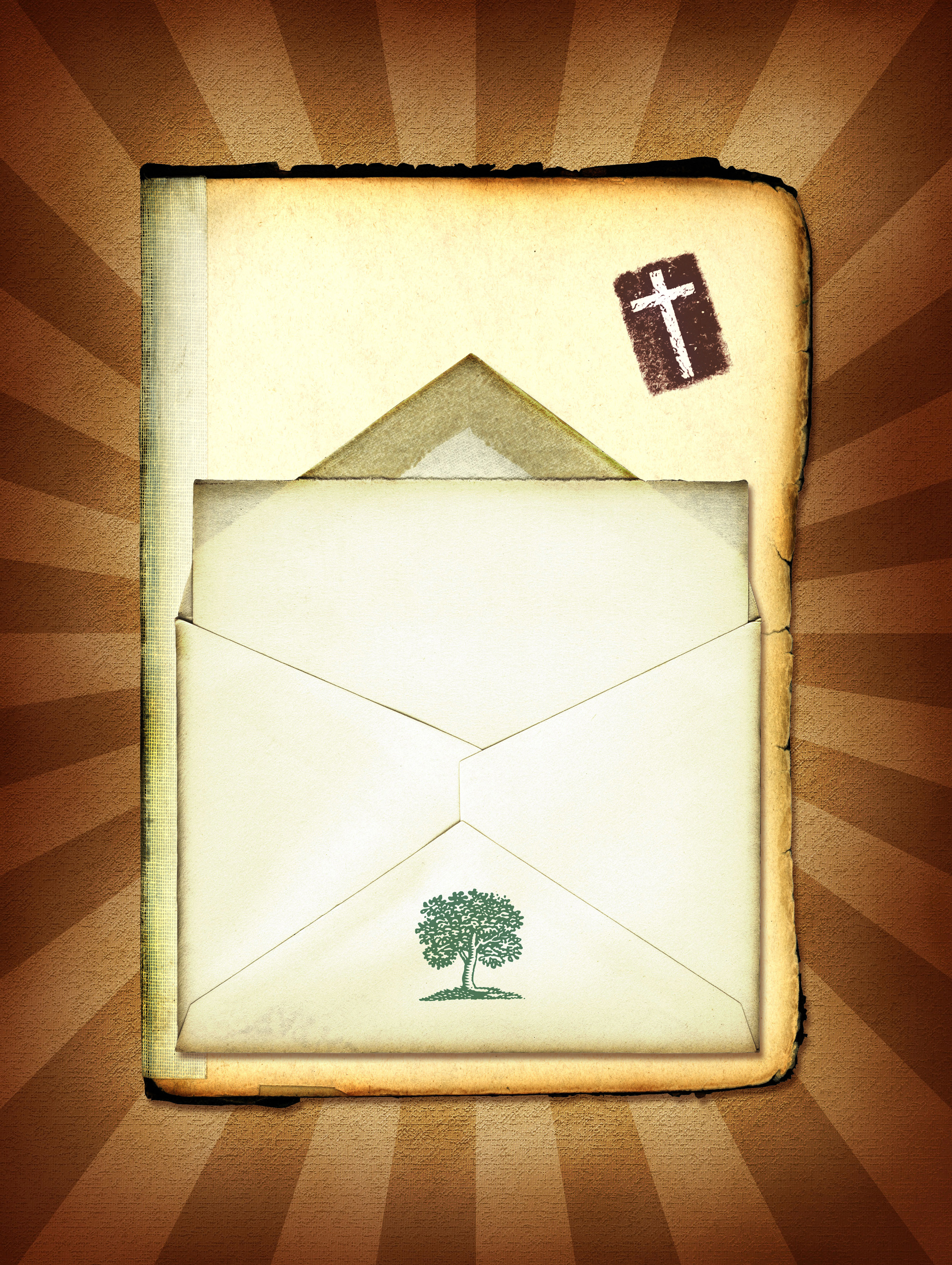
Don’t forget to get your Intention Letters in as soon as possible, if you haven’t done so already. Our Corporation is working on the Budget for our upcoming Vestry, and could really use this information.
A Word From Bishop Susan
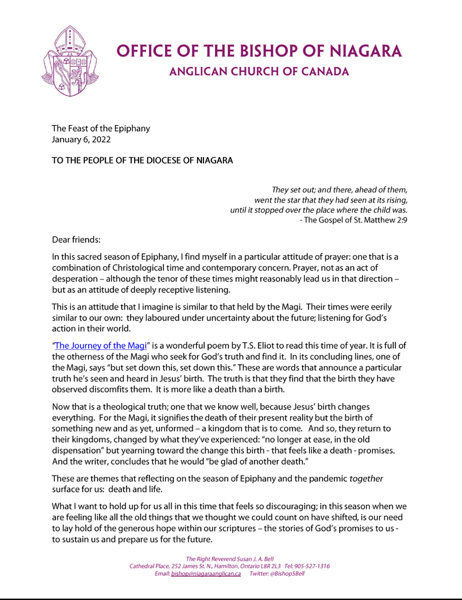
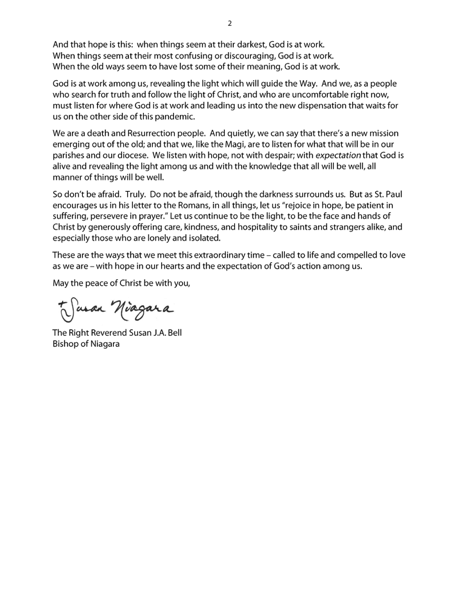
Readings and Collect for the Epiphany, January 9, 2022
Collect
Bright Morning Star,
your light has come,
and the birth of Jesus
has overwhelmed us with joy.
Like the magi of long ago,
may we be drawn to you
and offer you such gifts as we are able. Amen.
Readings
Isaiah 60: 1-6
Psalm 72: 1-7, 10-14
Ephesians 3: 1-12
Matthew 2: 1-12
In the time of King Herod, after Jesus was born in Bethlehem of Judea, wise men from the East came to Jerusalem, asking, ‘Where is the child who has been born king of the Jews? For we observed his star at its rising, and have come to pay him homage.’ When King Herod heard this, he was frightened, and all Jerusalem with him; and calling together all the chief priests and scribes of the people, he inquired of them where the Messiah was to be
born. They told him, ‘In Bethlehem of Judea; for so it has been written by the prophet:
“And you, Bethlehem, in the land of Judah,
are by no means least among the rulers of Judah;
for from you shall come a ruler
who is to shepherd my people Israel.”
Then Herod secretly called for the wise men and learned from them the exact time when the star had appeared. Then he sent them to Bethlehem, saying, ‘Go and search diligently for the child; and when you have found him, bring me word so that I may also go and pay him homage.’ When they had heard the king, they set out; and there, ahead of them, went the star that they had seen at its rising, until it stopped over the place where the child was. When they saw that the star had stopped, they were overwhelmed with joy. On entering the house, they saw the child with Mary his mother; and they knelt down and paid him homage. Then, opening their treasure-chests, they offered him gifts of gold, frankincense, and myrrh. And having been warned in a dream not to return to Herod, they left for their own country by another road.
Reflection for January 9, 2022 by The Rev’d Dr. Wayne Fraser
Let me tell you a Mystery!
The focus in Mathew’s gospel on the wise men from the East foreshadows the “mystery” of Christ’s birth, that is, as St. Paul clarifies in his letter to the Ephesians, that “the Gentiles should be fellow heirs . . . of his promise in Christ by the gospel,” meaning that God’s love includes everyone, “to make all see what is the fellowship of the mystery, which from the beginning of the ages hath been hidden in God who created all things by Jesus Christ.” The main theme of Paul’s letter concerns the “mystery”—notice that the word is repeated four times in this brief passage–and that there’s no mystery anymore. Paul refers to what was “in other ages not made known” but “is now revealed.” It was “hidden” only because mankind was too obtuse to see the truth. It takes humanity a while to figure out God’s truth; we’re rather slow. For the last two millennia, there should have been no mystery about God’s love for all humanity, for all creation, but looking at human history, especially the history of the church, the atrocities committed in the name of Jesus, the hatred between people of different races and religions, one wonders if the mystery is not still quite hidden. It’s a mystery to me how mankind keeps missing the truth; it is truly the peace that passes all understanding.
To see Christ in others: now therein lies a mystery. When joy and love manifest themselves in others, we easily recognize the spirit of Christ, the divine spark, for “where love is, God is.”
But I shouldn’t be surprised, for the gospel story itself presents the birth of Jesus in the midst of violence and intrigue, as King Herod seeks to kill the Christ child—the dark lord of the empire attacking the light of the world. Well into the third millennium, the dangers from sectarian violence, from terrorism, from the rise of fundamentalism in all religions, are increasing. As Western society becomes even more diverse and multi-cultural, the demands on entrenched social institutions and perspectives will require increased tolerance and patience, indeed, the peace and goodwill associated with Christ’s birth. It will require from Christians the ability to grasp and to live the mystery, to see that all people that on earth do dwell are all beloved children of the living God.
To see Christ in others: now therein lies a mystery. When joy and love manifest themselves in others, we easily recognize the spirit of Christ, the divine spark, for “where love is, God is.” That’s the easy part. Jesus challenges us because he identified himself with the marginalized in society, the sick and the suffering, the sinful and the lost: “as you do it to the least of these, you do it also to me” (Matthew 25). Mother Teresa spoke often of her faith in action, of seeing Christ in the face of the destitute and the dying. She challenges our tendency to categorize those in need, to divide people into the deserving and the undeserving poor. The task is to see Christ in those we might classify as “undeserving,” those we judge have created their situation, their misery. When Jesus fed the 5000, he didn’t administer a means test beforehand, he didn’t distinguish between the deserving and undeserving, but ministered to their common need. Our job is not to reason why, for each person is beloved of God; our task, as difficult and mysterious as it is to do, is to love unconditionally, to love extravagantly, to help them be all that they can be. That is the ideal Christ sets before us.
In all of these issues, the problem may be that within the Christian church, within the individual Christian soul, there actually may be no deep sense of mystery, no awe-inspiring experience of the infinite and the holy. There is no mystery about the meaning of Jesus, that God’s boundless love extends to all, but there may be no sense of mystery in our worship or in our daily lives. Kenneth Davis in his delightful, informative book, Don’t Know Much about the Bible, comments that “One of the reasons why religion seems irrelevant today is that many of us no longer have the sense that we are surrounded by the unseen.” Therein lies the mystery of Emmanuel. Like the wise men of old, we still search for epiphany, but we need not wander as far as they: “be still and know that I am God.” The mystery has been made known in Christ Jesus and our task is to seek continually the meaning of Christmas: God with us, God with us all, God within us, everyone, everywhere, always. The greatest Christmas present we receive is the gift of Epiphany, of God’s love for all of us. Let us accept that love ourselves and serve others that they too may know that love.
Family Activity Sheets for January 9th, 2022
Thank You, Thank You, Thank You!
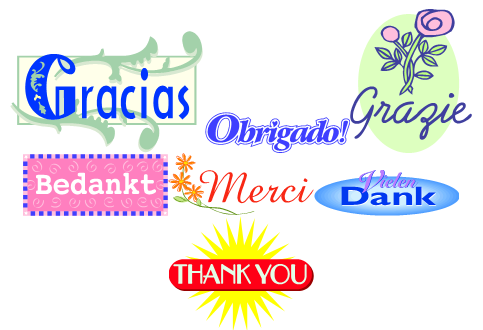
A huge thank you to everyone who worked so hard preparing for our Christmas celebrations! Although things did not go as we planned and hoped, all your work was noticed and very much appreciated.
Readings and Collect for the Second Sunday of Christmas, January 2, 2022
Collect
Gracious God,
you have redeemed us through Jesus Christ,
the first-born of all creation,
whose birth we celebrate as the child of Bethlehem.
Bless us with every spiritual blessing,
that we may live as your adopted children
and witness to your glory
with unending praise and thanksgiving. Amen.
Readings Jeremiah 31: 7-14
For thus says the Lord:
Sing aloud with gladness for Jacob,
and raise shouts for the chief of the nations; proclaim, give praise, and say,
‘Save, O Lord, your people,
the remnant of Israel.’
See, I am going to bring them from the land of the north,
and gather them from the farthest parts of the earth,
among them the blind and the lame,
those with child and those in labour, together;
a great company, they shall return here.
With weeping they shall come,
and with consolations I will lead them back,
I will let them walk by brooks of water,
in a straight path in which they shall not stumble;
for I have become a father to Israel,
and Ephraim is my firstborn.
Hear the word of the Lord, O nations,
and declare it in the coastlands far away;
say, ‘He who scattered Israel will gather him,
and will keep him as a shepherd a flock.’
For the Lord has ransomed Jacob,
and has redeemed him from hands too strong for him.
They shall come and sing aloud on the height of Zion,
and they shall be radiant over the goodness of the Lord,
over the grain, the wine, and the oil,
and over the young of the flock and the herd;
their life shall become like a watered garden,
and they shall never languish again.
Then shall the young women rejoice in the dance, and the young men and the old shall be merry.
I will turn their mourning into joy,
I will comfort them, and give them gladness for sorrow.
I will give the priests their fill of fatness,
and my people shall be satisfied with my bounty,
says the Lord.
Psalm 147: 13-21
Ephesians 1: 3-14
John 1: 1-18
Reflection for January 2, 2022 by Katherine Kerley
We are into a new year this coming week, and usually when we turn the page on a calendar or stay up until midnight wishing each other a Happy New Year, we are filled with hope and a sense of new beginnings: what are our goals and aspirations for the year ahead? Some of us make resolutions or plans for big changes that we often follow through for a short time before those plans fall by the wayside as life returns to its usual rhythm and we find ourselves in our usual patterns. And there’s absolutely nothing wrong with that.
No matter how far we stray from what we consider home, normal, or the path we expected for ourselves, whether it be a New Year’s resolution, the shifting reality of our lives as we face new challenges related to the pandemic, or whether we are displaced physically from our homes or have to go about our lives in different ways, God tells us that God will bring us home and take care of us.
Often when we make goals or changes in our lives, we bite off more than we can chew. We make goals that are too lofty, too challenging to maintain, or aren’t realistic. This can cause us to give up on our plans entirely instead of adjusting our goals to make it easier for us to feel successful in any changes we are wanting to make. If you are interested, there’s a concept called a smart goal that’s helpful in goal-setting: Specific, Measurable, Attainable, Realistic, and Time-Bound.
As I said above, though, whenever we try to make changes and shift the way we go about our daily lives, we often find ourselves shifting back into our regular patterns of being eventually. This is completely normal, and we all do it. We just need to be aware enough of the fact that our patterns have shifted and reassess our goals. And when that seems impossible, perhaps we can turn to God for guidance, support, and comfort.
In this week’s reading from Jeremiah, God is talking to the Israelites who have been banished into exile. The Israelites were questioning their relationship with God: the land that God had promised them was taken away from them and they didn’t know what to expect next. Instead of being a God of judgement that we often see in the Old Testament, here God is upheld as a comforter and a protector. God promises to rescue and care for his people.
No matter how far we stray from what we consider home, normal, or the path we expected for ourselves, whether it be a New Year’s resolution, the shifting reality of our lives as we face new challenges related to the pandemic, or whether we are displaced physically from our homes or have to go about our lives in different ways, God tells us that God will bring us home and take care of us.
Also, if you are among those who, like me, have no desire to set new goals and aspirations for the year and just find yourself wandering, trying to make sense of shifting realities day by day, I want you to know that you’re not alone. It’s ok to not be filled with hope right now. It’s ok to want the world to change around you without. God is with us no matter how we are feeling right now, and God will comfort and protect us in God’s own way and in God’s own time (no matter how frustrating it can be that God has God’s own sense of what “timely” means). God will gather us in from however far we wander, mentally, physically, and spiritually.
As you read this week’s reading from Jeremiah, pick out some words of comfort and ponder them for a bit. Maybe write them down on a piece of paper over and over again as a form of prayer. You could say them out loud to yourself as an affirmation. Or you could put them in the notes app on your phone as a reminder to yourself when times are difficult, that God is with you wherever you are and will bring you back to where you need to be.
Family Activity Sheets for January 2nd, 2022
A Special Message from the Right Reverend Susan Bell
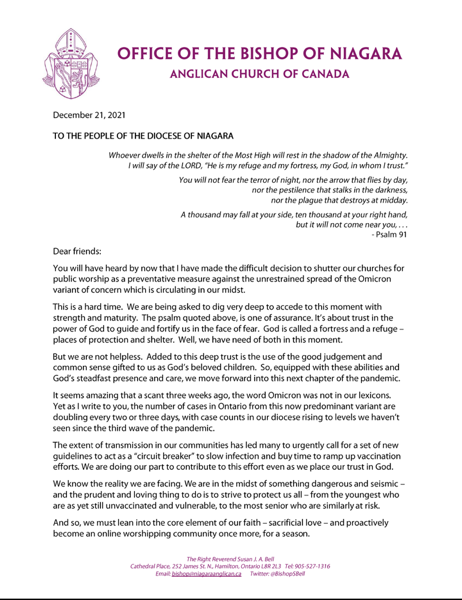
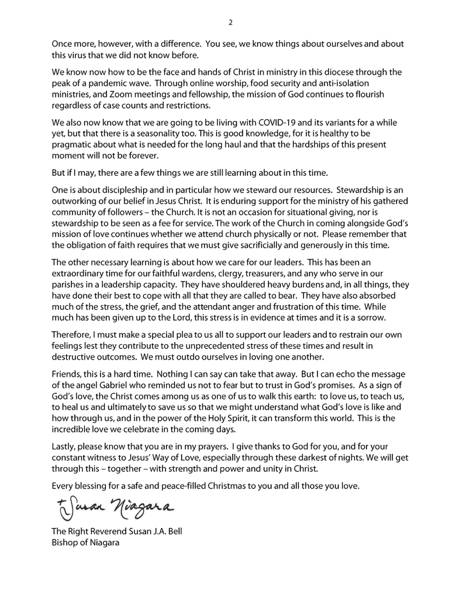
Readings and Collect for the First Sunday of Christmas, December 26, 2021
Collect
From our mother’s womb you have known us, O God. You call us to follow you through all our days
and seek us even when we wander.
As we advance in years,
clothe us with your love,
that we may grow in grace and find favour in your sight;
through Jesus Christ. Amen.
Readings
1 Samuel 2: 18-20, 26
Psalm 148
Colossians 3: 12-17
Luke 2: 41-52
Now every year his parents went to Jerusalem for the festival of the Passover. And when he was twelve years old, they went up as usual for the festival. When the festival was ended and they started to return, the boy Jesus stayed behind in Jerusalem, but his parents did not know it. Assuming that he was in the group of travellers, they went a day’s journey. Then they started to look for him among their relatives and friends. When they did not find him, they returned to Jerusalem to search for him. After three days they found him in the temple, sitting among the teachers, listening to them and asking them questions. And all who heard him were amazed at his understanding and his answers. When his parents saw him they were astonished; and his mother said to him, ‘Child, why have you treated us like this? Look, your father and I have been searching for you in great anxiety.’ He said to them, ‘Why were you searching for me? Did you not know that I must be in my Father’s house?’ But they did not understand what he said to them. Then he went down with them and came to Nazareth, and was obedient to them. His mother treasured all these things in her heart.
And Jesus increased in wisdom and in years, and in divine and human favour.
Reflection for December 26, 2021 by the Rev’d Donald Brown
And so we have come to the end of our Advent journey—that time of watching and waiting–waiting for signs of God with us–a time to think about four themes
First: A theme of hope, Israel’s hope for the coming of a Messiah, of Emmanuel and our hope for renewed faith.
Second: A theme of peace, God’s peace, peace within us, a world of peace—being instruments of God’s peace in the world.
Third: A theme of joy, rejoicing in God’s care for us through the Holy Spirit sharing in God’s joy. Being joyful signs of the Kingdom of God.
Finally: The theme of love, that God is love in action, caring, creating, compassionate that our faith should be love in action.
May the light of faith help us to proclaim that God is with us, now and forever.
Hope, Peace, Love, and Joy
Today as we celebrate the birth of Jesus we proclaim that all four things Hope, peace, love and joy are fulfilled. We recall the Angel’s message to the shepherds: Behold I bring you good news of a Great Joy, a saviour, the Messiah is born in the city of Bethlehem, hope is fulfilled.
We proclaim Jesus as the Prince of Peace, the son of righteousness, the hope of all nations. We are to rejoice that the glory of the Lord has been revealed. We are to rejoice in new hope that God is with us. We are to rejoice and announce the good news of this great joy to all people.
It is important for us to recognize the symbol that rings through the whole of the Christmas season is light. A light has come into the world and that light shines in the darkness and the darkness cannot overcome it. In the collect for today we prayed that this day is radiant with the brilliance of God’s one true light that Jesus is that one true light.
Light shone all around the shepherds. The wise men followed a light in the sky—the brightest of all the stars So, may the light of faith illumine our hearts. May the light of faith shine in our words and deeds
May the light of faith help us to proclaim that God is with us, now and forever.
